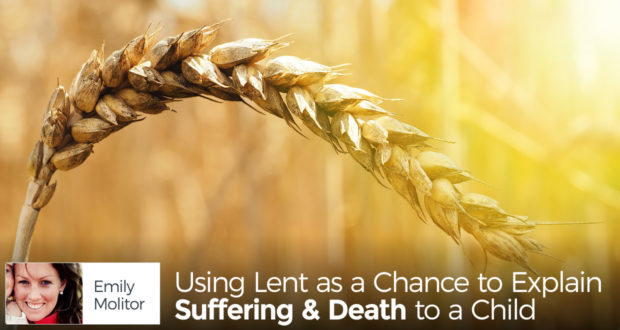This is the Bible verse which I will be discussing with my 3-6 year old students in our Catechesis of the Good Shepherd class next week:
“Unless a grain of wheat falls to the ground and dies, it cannot bear fruit.”
It seems appropriate for this time of year, when we are called to die to ourselves throughout Lent in order to live more fully in Christ. The concept is also important for my own family, as we struggle through the experience of two funerals of friends’ babies just this past month.
For my almost four-year-old daughter, attending the funerals of these children has opened up a whole new world of questions and confusion surrounding the understanding of life and death.
For me, it has opened my eyes to the realization that understanding truth begins at a young age, and to a recognition of the importance of my role as a parent in aiding my child’s grasp of the true beauty and meaning of life.
After the first funeral we attended, for a baby girl who had lived nine months with severe brain damage, my daughter Monica was filled with questions about death and heaven. The beauty of her child’s ability to grasp the heart of the matter was illustrated in a simple sentence she spoke following our discussion of why God had taken this baby to heaven.
She told me with all sincerity that “she (the baby) must have been really special.” Yes, I replied, she was. It touched my heart to see how she was capable of going right to the essential truth: that God had created this child special, and that she was very important to Him, no matter what.
Christ desires that all of us use our intellects to see as a child does – to grasp the truth behind the confusion of suffering and death – and to make an act of faith in the midst of it. Lent is sometimes the hardest time of the year to feel inspired or faithful in the face of sorrow.
It is cold, not yet spring, and our souls feel burdened down by the weight of winter and our many responsibilities. But when we encounter the real, intense suffering of friends or family, we realize that life is not ultimately about our ups and downs, but about keeping faith no matter what trials we are called to face.
Staring death in the face reminds me that I am human, mortal, and in dire need of daily grace to keep up the fight. The important stuff of life does not depend on how tired or sick I feel, or how optimistic I am, but upon the eternal gifts of God – faith, family, friends, charity, and truth.
In order to help our kids begin to grasp the deep meaning of life, or to be a strong support for a suffering friend, we must embrace with perseverance the daily life that we are called to live, and strive to see the deeper meaning behind it all.
As a friend of mine recently said, “Sometimes, doesn’t it all feel like a drag!” I found this honest expression to be somewhat inspiring for the season of Lent, when yes, fasts and sacrifices and taking care of sick children does seem to be nothing more than a big drag. What about all of the people having fun at beautiful resorts around the world and dining on delicious fare?
But yet, what about all of the parents suffering in hospitals at the bedsides of their sick children? The apparent dichotomy of life can be downright jolting at times, and I discover a new appreciation for the beauty of the commonplace if, and when, I take the time to reflect upon it.
Precisely what God is calling us to suffer or to enjoy can only be accepted or embraced when He gives it to us, and until then we are called to be faithful stewards of the blessings He has given us, practicing faithfulness in the little things.
Perhaps Lent is a golden opportunity to embrace the very questions God places deep in our souls—the struggles of my child to understand the meaning of death, the pain of my friend upon losing her baby, the acceptance of life not always being what we expected—these questions can become a source of tremendous growth in our hearts if we embrace them as God’s will and accept them as a penance He sends to us with His loving hands, instead of insisting upon our own chosen goals.
For, as Christ tells us, only when we die to self, will we bear much fruit.

 Seton Magazine Catholic Homeschool Articles, Advice & Resources
Seton Magazine Catholic Homeschool Articles, Advice & Resources
